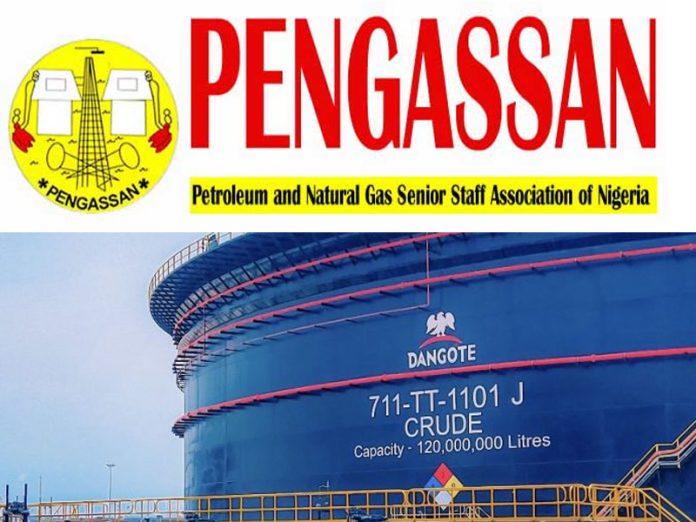Nigeria’s energy sector has been thrown into fresh turmoil as the ongoing strike by the Petroleum and Natural Gas Senior Staff Association of Nigeria (PENGASSAN) continues to disrupt oil and gas production, fuel supply, and electricity generation—leaving ordinary citizens, industry players, and investors increasingly anxious about the country’s economic direction.
The strike, which began over the dismissal of more than 800 unionised workers by the Dangote Refinery, has already reduced Nigeria’s crude oil output by about 16 percent—roughly 283,000 barrels per day—and cut gas supply by an estimated 1.7 billion standard cubic feet daily. Power generation has also dropped significantly, forcing many parts of the country into longer hours of darkness.
At filling stations, motorists are beginning to queue again. In homes and markets, the price of cooking gas has jumped by more than 30 percent, stretching household budgets already battered by inflation and a weak naira. For small businesses, especially those relying on fuel and power for daily operations, the impact is immediate and painful.
“We Just Want to Work, Not Fight”
For many oil and gas workers, the strike is about more than job losses—it’s about dignity.
“We just want fairness. People who gave their best were suddenly thrown out. That’s not right,” said a senior PENGASSAN member who asked not to be named. “No one wants a strike, but we can’t keep quiet when workers are treated unjustly.”
The Dangote Refinery, which is seen as the flagship of Nigeria’s energy independence plan, has described the strike as “unjustified and disruptive,” warning that halting operations could hurt the entire economy. A company source said the refinery is open to discussions but insists that “industrial pressure must not come at the expense of national progress.”
A Nation Feeling the Strain
The ripple effects are spreading fast. With less gas flowing to power plants, the national grid has become unstable, leading to more blackouts. Factories are reporting higher production costs, and transport operators are raising fares.
Economists warn that if the impasse continues, the country could lose millions of dollars in revenue daily.
“Every barrel lost, every hour of power outage, chips away at investor confidence,” said Dr. Lucas Mendes, an energy analyst with Global Insights Africa. “Nigeria’s energy story is one of huge potential, but investors also want to see predictability, dialogue, and respect for the rule of law.”
Government in Search of a Middle Ground
Alarmed by the growing crisis, the Federal Government has stepped in to mediate. Representatives from the Ministry of Labour, NNPC Ltd., and the Nigerian Midstream and Downstream Petroleum Regulatory Authority (NMDPRA) have been holding closed-door meetings with PENGASSAN and Dangote officials in Abuja.
Sources close to the talks say both sides have shown a willingness to compromise, though no firm resolution has yet been reached. President Bola Tinubu, it was gathered, has directed relevant ministries to “act swiftly to protect jobs and secure the country’s energy stability.”
Investor Confidence at Stake
Beyond the picket lines, global investors are watching closely. The Dangote Refinery—one of Africa’s most ambitious industrial projects—is a symbol of Nigeria’s promise to refine its own crude oil and reduce import dependence. But for investors, the standoff is a warning sign.
“Nigeria remains one of Africa’s biggest energy markets, but consistency is key,” said Fiona Clarke, a regional analyst at Energy Frontier Partners. “Investors need assurance that disputes can be resolved through structured engagement, not shutdowns.”
The Human Cost
For millions of Nigerians, the big numbers—barrels, cubic feet, megawatts—translate into real struggles: higher fuel costs, fewer working hours, dimly lit streets, and uncertain futures.
A mother of three in Lagos summed it up simply while refilling her gas cylinder at a higher price:
“We don’t understand their quarrel, but we’re the ones paying for it. Everything is getting harder.”
As negotiations continue, the nation waits—hoping that common ground will be found soon, and that the promise of energy abundance will not again be overshadowed by crisis and conflict.
ANTHONY EMEKA NWOSU




